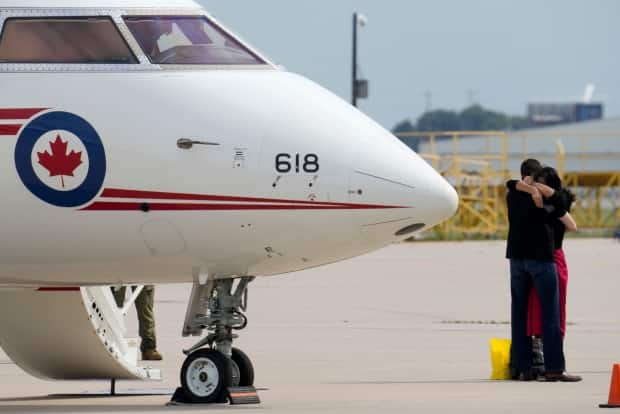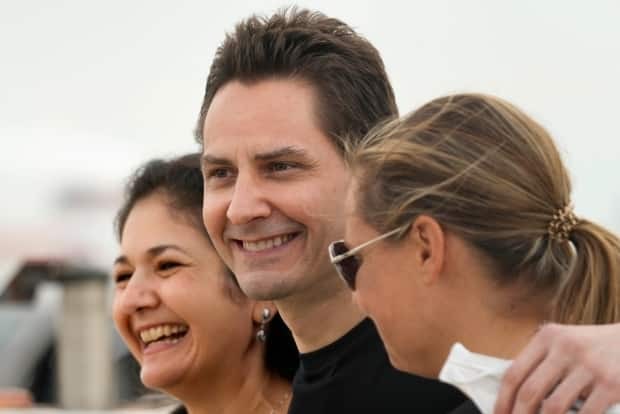Michael Kovrig and Michael Spavor arrive in Canada after nearly 3-year detention in China

Canadians Michael Kovrig and Michael Spavor are back on home soil, almost three years after they were first detained in China.
The two men landed in Calgary shortly before 8 a.m. ET Saturday aboard a Royal Canadian Air Force Challenger aircraft. Prime Minister Justin Trudeau and Foreign Affairs Minister Marc Garneau were at the airport to welcome the two men, who had flown from China along with ambassador Dominic Barton.
Trudeau announced Friday evening that the two were out of Chinese airspace, just hours after the extradition case against Huawei executive Meng Wanzhou was dropped. Meng reached a deferred prosecution agreement with U.S. authorities related to fraud charges against her on Friday and landed back in China Saturday morning.
Michael Kovrig reboarded a plane in Calgary to fly on to Toronto, where Vina Nadjibulla, his wife (separated), and his sister, Ariana Botha, spoke before he landed.
"There are no words to describe the emotions that have been running through us these last 24 hours. Joy, relief, overwhelming gratitude for everyone who has worked to make this happen," Nadjibulla said.

She said she had spoken over the phone with Kovrig while he was in Calgary and said he felt it was like "coming into another world."
Kovrig spoke briefly to reporters after he landed early Saturday afternoon, saying he felt "fantastic."
Kovrig, a diplomat, and Spavor, an entrepreneur who worked in North Korea and China, were first detained in December 2018 — just after Meng was arrested in Canada on behalf of U.S. authorities. Their detention is widely considered to be a retaliatory action in response to the Huawei executive's arrest.

'Sorry for the inconvenience caused': Meng
Chinese authorities had consistently denied that the cases were linked. In a statement Saturday, China's foreign ministry said the charges against Meng were "purely fabricated."
"It has long been a fully proven fact that this is an incident of political persecution against a Chinese citizen, an act designed to hobble Chinese high-tech companies," the statement said.
Spavor was found guilty of spying and sentenced to 11 years in prison and deportation by a Chinese court in August. The trial for Kovrig concluded in March, but he had not yet been sentenced.
Watch | Huawei executive Meng Wanzhou arrives in China
Speaking Friday outside a Vancouver courthouse after her extradition case was dropped, Meng thanked the court and the Canadian government for "upholding the rule of law."
"I'm also grateful to the Canadian people and media friends for your tolerance. Sorry for the inconvenience caused," she said.
Meng spent her time in Canada under house arrest at her multimillion-dollar home in Vancouver, in stark contrast to Michael Kovrig and Michael Spavor, who endured poor conditions in detention and whose legal processes were criticized by Canadian officials. Foreign Affairs Minister Marc Garneau said Spavor's sentencing followed a "mock sham trial."
Timing shows clear link between cases, experts say
The timing of the releases of Meng, and Spavor and Kovrig, show China clearly saw a connection between the two, several diplomats and foreign policy experts told CBC News.
"China ... up until now, has said that there's been no linkage between the two, but by putting them on the plane [Friday night], they've clearly acknowledged that this was hostage-taking," said Colin Robertson, a former Canadian diplomat for more than 30 years.
LISTEN | Michael Kovrig and Michael Spavor freed:
Robertson told CBC's The House "it really was one for the other" in an exchange that was reminiscent of Cold War swaps.
"The timing, it's totally undeniable that the two Michaels were unjustly detained because of the arrest of Ms. Meng in Vancouver," Lynette Ong, a specialist on China at the Munk School of Global Affairs, told The House host Chris Hall.
The rapid series of events Friday "was a surprise," said Margaret McCuaig-Johnston, a senior fellow at Graduate School of Public and International Affairs at the University of Ottawa.
Watch | Michael Kovrig and Michael Spavor are back in Canada
She noted that Spavor's and Kovrig's detention had already sent a message to other countries "that if they cross China, then Beijing will just pick up a couple of their citizens and hold them hostage."
"And that's a chilling message for other countries to be receiving today."
Robertson said Canadians should give significant credit for the release of the men to U.S. President Joe Biden.
"As the prime minister said, this was the top issue in terms of Canada-China relations, but also a top issue in Canada-U.S. relations," he said. "President Biden has delivered now for Justin Trudeau.
Watch | Kevin Garratt reacts to return of Michael Kovrig and Michael Spavor
Changed relationship with China
The release of the two men was enthusiastically welcomed by Canadian politicians late Friday.
Trudeau has said the return of the so-called "two Michaels" has been a top foreign policy priority for the government. David Morrison, a foreign affairs and defence adviser to the prime minister, and Kirsten Hillman, ambassador to the United States, were both deeply involved in the efforts leading up to the release of the two Michaels.
But the prime minister deflected questions Friday about how the return on the two men would affect Canada's relationship with China.
Guy Saint-Jacques, who served as Canada's ambassador to China from 2012 to 2016, said it is impossible to ignore China, given its strength and importance in the world, but the approach should be "strategic" and "restrained."
"The message to China is simple, it's we have no problem with you being a superpower. But as long as you respect international treaties, international obligations and you don't engage in bullying tactics," he said.
Ong said she believes the relationship with China has been permanently damaged. She said public opinion in Canada has turned decisively against China and a return to normal would be "very hard" to execute.
"I don't think Canada-China relations could actually be repaired. We're living in an entirely different world now."

 Yahoo Movies
Yahoo Movies 